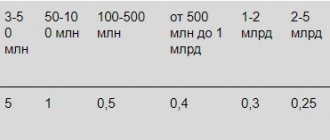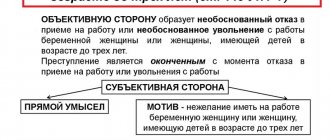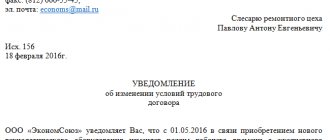- Legal assistance
- Legal services
- Drawing up contracts
- Default
>
>
>
By concluding an agreement, counterparties undertake obligations, violation of which may result in the application of sanctions: penalties, fines, penalties, seizure of the collateral and other adverse consequences.
What is an obligation from a legal point of view?
The concept of obligation is legislatively enshrined in paragraph 1 of Art. 307 Civil Code of the Russian Federation. This term refers to the need for one person (debtor, counterparty) to perform certain actions in favor of another person (creditor). For example, fulfill the terms of the contract for the provision of services, performance of work, delivery, return or provision of funds.
Obligations may arise from the terms of a contract and transactions, but may also arise by force of law, for example, in connection with damage or unjust enrichment.
Sometimes parties enter into transactions without concluding an agreement; such an example is the provision of an offer and its acceptance (acceptance). The same principle is often used to provide services aimed at a wide range of people. Disputes regarding such civil legal relations are regulated by current legislation.
Supplier liability
| Type of violations | Responsibility under the supply contract | Base |
| Violation of the seller’s obligation to transfer the goods free from the rights of third parties | The buyer has the right to demand that the supplier reduce the price or even terminate the contract. But if it is proven that he knew about the rights of third parties, his demands may not be satisfied | Article 460 of the Civil Code of the Russian Federation |
| Violation of the quantity condition | If the seller has transferred a smaller quantity of inventory items, the buyer has the right (unless otherwise stated in the agreement):
| Article 466 of the Civil Code of the Russian Federation |
| Violation of the assortment condition | The buyer has the right to refuse to accept and pay for goods and materials, and if they are paid, to demand a refund. If the seller simultaneously transferred goods with goods and materials in violation of the assortment conditions, the buyer has the right, at his choice:
| Article 466 of the Civil Code of the Russian Federation |
| Delivery of inadequate quality | The buyer to whom products of inadequate quality have been transferred has the right to demand from the seller:
| Article 475 of the Civil Code of the Russian Federation |
| Transfer of incomplete goods | The buyer has the right, at his own discretion, to demand from the seller:
If the seller has not fulfilled the requirements for completion, the buyer has the right to:
| Article 480 of the Civil Code of the Russian Federation |
Specific forms of liability are established by Article 520 of the Civil Code of the Russian Federation. If the buyer fails to comply with the buyer's requirements to eliminate deficiencies in inventory or to complete the goods, he has the right to purchase undelivered property from other persons with all necessary and reasonable acquisition costs charged to the supplier.
Penalty
In addition to the forms of supplier liability discussed above, the payment of a penalty for non-fulfillment or improper fulfillment of the terms of the contract may additionally be provided.
In accordance with Art. 330 of the Civil Code of the Russian Federation, a penalty (fine, penalty) is recognized as a sum of money that the debtor is obliged to pay to the creditor in the event of non-fulfillment or improper fulfillment of an obligation, in particular in the case of delay in fulfillment. It is important to emphasize that upon a request to pay a penalty, the creditor is not required to prove that he suffered losses.
Article 331 of the Civil Code of the Russian Federation determines that an agreement on a penalty is drawn up in writing, regardless of the form of the main obligation, otherwise the agreement on a penalty is invalid.
A penalty for short delivery or late delivery is collected from the supplier before the actual fulfillment of the obligation within the limits of his obligation to make up for the underdelivered quantity of inventory items in subsequent delivery periods, unless a different procedure for paying the penalty is established by law or agreement (Article 521 of the Civil Code of the Russian Federation).
This rule is interesting because the penalty for the cost of goods and materials not delivered in the previous period is collected a second time if they are not transferred to the acquirer. This is due to the fact that the quantity of goods not transferred in the previous period is added to the inventory items that must be transferred in the next period (in the next private period), and a penalty is charged from this quantity in case of failure to fulfill the obligation.
It should be understood that the specified penalty is collected from the supplier, regardless of whether there is a provision for a penalty in the supply agreement. This is the so-called “legal” penalty (Article 332 of the Civil Code of the Russian Federation).
What is a breach of contract and when is it legal?
Failure to fulfill obligations under contracts, transactions, by force of law, is a violation of the conditions stipulated by the contract, offer or legislation. As a rule, this is accompanied by causing losses to the counterparty or creditor.
Civil Code of the Russian Federation by virtue of Art. 309 and art. 310 does not provide for unilateral refusal to execute agreements, transactions, contracts, etc., unless otherwise provided by the terms of the agreement or the law.
Thus, if the counterparty fails to fulfill the terms of the transaction, then he can be held accountable.
Liability measures include: penalties, fines, penalties, recovery of damages caused, lost profits, moral damages, and more.
The amount of penalties, penalties, fines can be determined by the terms of the contract (contractual penalty, Article 330 of the Civil Code) or by law, in particular Art. 15 and art. 395 of the Civil Code of the Russian Federation.
The legislation provides for cases where failure to fulfill obligations does not entail the application of sanctions.
Such cases include:
- circumstances of force majeure (force majeure)
- lack of guilt
These circumstances, as a rule, have to be proven in court to avoid the accrual of penalties and fines.
Please note that non-performance of contracts cannot be justified by the lack of necessary goods in the market or non-performance of transactions by third parties.
Obligations under the contract may not be fulfilled if the contract provides for the possibility of unilateral refusal or termination of the transaction or on the grounds provided for by law.
Please note: people are often mistaken about the possibility of not fulfilling the terms of a transaction, for example, if a bank’s license was taken away or the counterparty filed for bankruptcy, this does not mean that obligations under the contracts are automatically terminated. In such cases, as well as when the counterparty evades acceptance of execution of the transaction, you can use the deposit of a notary or court. This is provided for by current legislation and exempts you from penalties in the future.
Obligations under contracts are terminated only by their execution. In other cases, penalties may be applied unless otherwise provided by the contract or legislation.
RESPONSIBILITY OF THE PARTIES UNDER THE DELIVERY AGREEMENT FOR STATE AND MUNICIPAL NEEDS
Liability for supplies for state and municipal needs is established in accordance with the general rules on contractual liability. In accordance with Articles 15 and 393 of the Civil Code of the Russian Federation (hereinafter referred to as the Civil Code of the Russian Federation), along with compensation for losses, it is possible to collect a penalty (penalty, fine). The significant importance of supplies for state and municipal needs determined the rather extensive use of legal penalties and increased both pre-contractual liability54 and, in general, the liability of the parties for non-fulfillment or improper fulfillment of certain obligations. For example, if the supplier unreasonably evades concluding a contract, the supplier pays the buyer a fine in the amount of the cost of the products established in the draft contract.
One of the parties compensates the other party for losses in case of improper performance or non-fulfillment of a state (municipal) contract or an agreement for the supply of goods for state (municipal) needs. Penalties (penalties, fines) and interest may be collected in accordance with the law.
Failure to comply with the essential terms of the contract entails a number of negative consequences. In order to analyze the application of liability as an example, let us consider judicial practice. Thus, according to the resolution of the Federal Antimonopoly Service of the Volga District dated 02/03/2014 in case No. A12-9758/201355, a state contract was concluded between the parties for the supply and installation of equipment. Considering that the supplier violated the delivery and installation deadlines, the customer filed a claim for a penalty. The court found that the goods were transferred within the time limits established by the contract. The equipment was accepted without any complaints regarding completeness and quality. At the same time, the obligations to commission and install the equipment into operation were not fulfilled due to the unpreparedness of the premises. Refusing to satisfy the stated requirements, the court indicated that the delay in the contract was due to the fault of the equipment buyer.
As you can see in this example, the responsibility lies with the customer.
However, failure to fulfill contractual obligations may also arise for reasons beyond the control of the parties. So, for example, after sending a draft contract for signing, the participant sent a protocol of disagreements to the operator of the electronic platform, in which he asked to replace a number of equipment items due to the suspension of production, but the signed draft contract was not sent to the operator of the electronic platform within the prescribed period, the court found that the signed the draft contract was not sent by the participant without good reason, and therefore he was recognized as having evaded concluding the contract, and information about him was included in the register of unscrupulous suppliers56. It seems that in this case the supplier’s actions were not dishonest: the evidence of non-fulfillment of the contract was identified in advance at the stage of signing the contract, and attempts were made to resolve the situation. The above, of course, indicates the active actions of the supplier aimed at preventing the emergence of a legal conflict in connection with the objective circumstances that have arisen, but in no way about evading the conclusion of a contract.
54 Volkova M.A., Lenkovskaya R.R. Pre-contractual liability: problems of legal nature // Current problems of Russian legislation. 2015. No. 11. P.21-28.
55 Resolution of the Federal Antimonopoly Service of the Volga District dated 02/03/2014 on case No. A12-9758/2013 // ATP “ConsultantPlus”.
56 Efimova O.V. Government contract with an unscrupulous supplier? // Law. 2014. No. 2. P. 88-89.
In view of the special legal regulation of supplies for state and municipal needs, we will consider the liability provided for in special regulations57. For example, persons guilty of violating the legislation of the Russian Federation on the contract system in the field of procurement, as well as in the field of state defense procurement, bear administrative, civil, disciplinary, and even criminal liability. Officials, in particular operators of electronic platforms, are obliged to compensate for losses in the event of damage caused by their unlawful actions (disclosure of information obtained during electronic auctions)58.
The supplier is responsible for: incomplete pawning, short delivery (fine in the amount of 50% of the cost of undelivered (unpledged) material assets, penalty in the amount of 0.1% of the cost of untimely delivered values, compensation for losses); for the delivery of unsuitable, incomplete, or poor-quality assets (a fine of 20% of the value of the rejected material assets); for the supply of improperly marked or unmarked material assets (a fine of 5 percent of the value of the specified material assets).
The customer is responsible: for late payment of delivered goods (pays interest in the amount established by Article 395 of the Civil Code of the Russian Federation). An example of liability is the resolution of the Arbitration Court of the North-Western District dated March 16, 2015 in case No. A52-930/201459, according to to which, satisfying the requirement for the obligation to refresh the material assets of the state reserve, the qualitative safety of which was not ensured in accordance with the inspection report dated November 16, 2012, and for recovery on the basis of clause 12 of Art. 16 of the Federal Law of December 29, 1994 No. 79-FZ “On State Material Reserves” (hereinafter referred to as Law No. 79-FZ) a fine in the amount of 163,310 rubles. 08 kop. In accordance with paragraph 2 of Art. 13 of Law No. 79-FZ, refreshing the stocks of the state reserve and replacing material assets of the state reserve are carried out by the responsible custodians independently without attracting additional budgetary funds, and according to clause 12 of Art. 16 of the same Law in case of violation of the conditions and rules for storing material assets, as well as in cases of untimely refreshment of state reserve stocks, replacement of material assets, storage of material assets of the state reserve that do not comply with the nomenclature of material assets of the state reserve, the requirements of technical regulations and other mandatory requirements in accordance with According to the legislation of the Russian Federation, responsible custodians pay a fine of 20% of the price of material assets. The collection of a fine by court decision dated April 23, 2012 in case No. A52-1464/2012с terminates the offense recorded in the inspection report dated September 14, 2011, but does not terminate the Company’s obligation to refresh material assets. A custodian who fails to refresh the material assets of a government reserve commits a continuing offence. Carrying out control functions, the Office of Rosrezerv established that the Company never refreshed the material assets of the state reserve, which was confirmed by an act dated November 16, 2012.
After the court decision has entered into legal force, the Office of Rosrezerv, having established the fact of non-renewal, has the right to again raise the issue of collecting a fine. Law No. 79-FZ does not establish deadlines for refreshing material assets of the state reserve; the Company, as a responsible custodian, must refresh them as necessary. The company is held accountable not for failure to fulfill an obligation with a certain deadline, but for a continuing offense. Therefore, the provisions of paragraph 2 of Art. 200 Civil Code of the Russian Federation are not applicable. The defendant did not provide the court with evidence that the amount of the fine was disproportionate to the consequences of violating the obligation and did not apply for a reduction in the amount of the fine on the basis of Article 333 of the Civil Code of the Russian Federation.
Based on the foregoing, it follows that the legislator imposes special responsibility on government customers carrying out procurement and imposes increased measures of responsibility for both the customer and the supplier.
57 See, for more details: Starodumova S.Yu. Responsibility and liability measures in Russian civil law // Current problems of Russian legislation. 2015. No. 12. P.138-151; Starodumova S.Yu. On the relationship between measures of protection and measures of liability in civil law / in the collection Main problems and development trends in modern jurisprudence. – Volgograd, 2015. P.40-42.
58 Efimova O.V. Pledge of obligatory rights / in the collection of modern humanities: problems and prospects for development. – Ryazan, 2015. P.64-67.
59 Resolution of the Arbitration Court of the North-Western District of March 16, 2015 in case No. A52-930/2014 // ATP “ConsultantPlus”.
Bibliography
1. Volkova M.A., Lenkovskaya R.R. Pre-contractual liability: problems of legal nature // Current problems of Russian legislation. 2015. No. 11. P.21-28.
2. Efimova O.V. Government contract with an unscrupulous supplier? // Law. 2014. No. 2. P. 88-89.
3. Efimova O.V. Pledge of obligatory rights / in the collection of modern humanities: problems and development prospects. – Ryazan, 2015. P.64-67.
4. Starodumova S.Yu. On the relationship between measures of protection and measures of liability in civil law / in the collection Main problems and development trends in modern jurisprudence. – Volgograd, 2015. P.40-42.
5. Starodumova S.Yu. Responsibility and liability measures in Russian civil law // Current problems of Russian legislation. 2015. No. 12. P.138-151.
How to determine the amount of the penalty?
There are two main approaches to determining the amount of fines and penalties.
- Contractual penalty . The contract may provide for a fine or penalty for violation of a particular clause of the contract. In this case, the amount of the penalty is determined in accordance with such conditions.
- According to the law . If damage is caused, damage to property or health, if funds are unlawfully withheld, if there are no fines in the contract, then you should use the legal mechanisms established by law.
Please note: the simultaneous application of contractual sanctions and Art. 395 Citizen code is impossible.
It should also be remembered that a reduction in the amount of penalties and other restrictions is not allowed if they are enshrined in the law, for example, on the Protection of Consumer Rights. Limitation of the rights of counterparties by contractual terms is allowed only if this is indicated by law; other restrictions are void and may not be applied by the courts during the proceedings.
Please note: when certain clauses of the contract are declared void or invalid, the statute of limitations will be taken into account. If you believe that a contract violates your rights, you should take immediate action to prevent the statute of limitations from running out. In different cases, it can be one or three years.
GLX Consult
8. Responsibility of the parties
8.1. In case of violation of the deadline for payment for goods provided for in clause 7.3 of this agreement, the Supplier has the right to collect from the Buyer a penalty in the amount of 0.5% of the debt amount for each day of delay in payment. 8.2. In case of non-fulfillment or improper fulfillment of the obligations provided for in this agreement, the parties bear responsibility in accordance with the current legislation of the Russian Federation. 8.3. Payment of penalties and compensation for losses caused by improper fulfillment of obligations does not relieve the parties from fulfilling their obligations under this agreement and does not entail termination of the agreement.
9.Force majeure
9.1. The parties are released from liability for partial or complete failure to fulfill obligations under this agreement in the event of force majeure circumstances. 9.2. The fulfillment by the parties of their obligations under the agreement is postponed in proportion to the time of the circumstances specified in clause 10.1. 9.3. A party that fails to fulfill its obligation due to force majeure is obliged to immediately notify the other party in writing. The notice must be confirmed by the competent government agency.
10.Dispute resolution
10.1. The parties take all necessary measures to resolve disputes under this agreement. 10.2. If the parties fail to resolve disputes, all disputes and disagreements between the parties that have arisen or may arise in connection with this agreement (a specific legal relationship), including those related to its conclusion, execution, modification, termination, or invalidation, shall be submitted to the Arbitration Court for consideration at the location of the plaintiff.
11. Duration of the contract
11.1. This agreement comes into force from the moment of its signing and is valid until December 31, 2012, and in terms of mutual settlements until their full completion. 11.2. In the absence of an application from one of the parties to terminate the contract at the end of its validity period, it is considered extended for the next calendar year and on the same conditions.
12.Other conditions.
12.1. This agreement must be signed by authorized representatives of the parties and drawn up in two copies - one for each party. 12.2. All changes, additions, agreements and appendices to this agreement are an integral part of it and are considered valid if they are signed by both Parties. In this case, faxograms received by the Supplier are recognized as valid if the faxogram contains the signature and seal of the Buyer and the Supplier has signed and stamped it. The Supplier also has the right to send documents to the Buyer by fax, and confirmation of the fact of sending and receiving the document is an extract from the Supplier's outgoing fax log, the responsibility for maintaining which rests with the Supplier. 12.3. In cases not provided for by this agreement, the parties are guided by the current legislation of the Russian Federation. 12.4.The provisions and conditions of this agreement are confidential and are not subject to disclosure. 12.5.In the event of a change in the details, the parties undertake to notify each other no later than three days from the date of their change. 12.6.The risk of accidental loss or accidental damage to goods passes to the Buyer from the moment it arises. ownership rights to goods.








